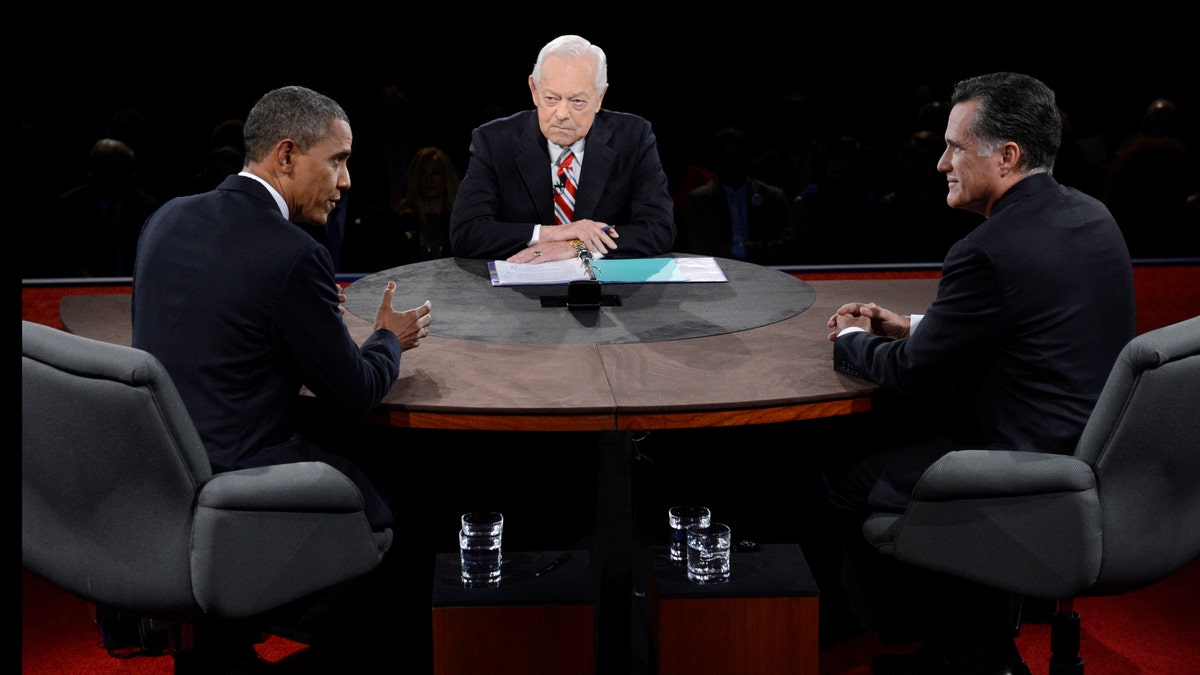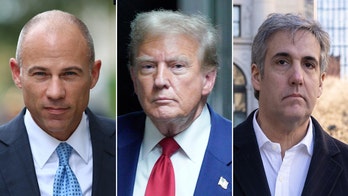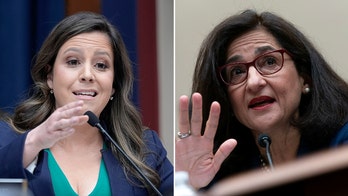
President Barack Obama speaks as Republican presidential nominee Mitt Romney and moderator Bob Schieffer listen during the third presidential debate at Lynn University, Monday, Oct. 22, 2012, in Boca Raton, Fla. (AP Photo/Pool-Michael Reynolds) (AP2012)
Boca Raton, Fla. – President Barack Obama pushed his on-the-job knowledge in foreign policy in the third and final presidential debate before the Nov. 6 election, while challenger Mitt Romney coolly defended himself, saying the last four years have brought the world “closer to a nuclear Iran."
Obama tried to cast Romney as an amateur about foreign policy, saying at one point: “You haven't actually been in a position to execute foreign policy, but every time you've offered an opinion,you've been wrong.”
Romney, in turn, accused the president of being weak in foreign policy, and going on “an apology tour,” undermining the United States’ authority.
Latin American came up fleetingly -- to the chagrin of many Latinos who took to social media to bemoan its virtual absence – and only because Romney brought it up. He has brought it up in other debates as well, but as he did other times, Obama did not acknowledge it.
“We're going to increase our trade,” Romney said, in describing what he would do if elected. “Trade grows about 12 percent per year. It doubles about every -- every five or -- or so years.”
Latin America's economy is almost as big as the economy of China. We're all focused on China. Latin America is a huge opportunity for us.
“We can do better than that, particularly in Latin America. The opportunities for us in Latin America we have just not taken advantage of fully,” he said. “As a matter of fact, Latin America's economy is almost as big as the economy of China. We're all focused on China. Latin America is a huge opportunity for us: time zone, language opportunity.”
In the only other instance where Latin America and overseas Latino leaders arose in the debate, Romney accused Obama of being too easy on “the world’s worst actors.”
“From the very beginning, the president, in his campaign some four years ago, said he'd meet with all the world's worst actors in his first year,” Romney said. “He'd -- he'd sit down with Venezuelan President Hugo Chávez and -- and Kim Jong-Il, with Castro and with -- with President Ahmadinejad of -- of Iran. And -- and I think they looked and thought, well, that's an unusual honor to receive from the president of the United States.”
Each time, Obama did not respond to the specific references about Latin America and Venezuelan President Hugo Chávez and the Castro brothers, Raul and Fidel. Mexico did not come up, despite its place as the United States' largest trading partner, the push-pull economic factors that have sent millions of Mexicans across the border -- often putting their lives in danger -- and the drug cartel violence that teeters on the U.S.-Mexican border.
One Twitter user said: “These guys only seem to be worried about China and the Middle East. Perhaps Latin America not ‘scary’ enough."
Despite the debate's stated focus on foreign affairs, time after time the rivals turned the discussion back to the slowly recovering U.S. economy, which polls show is the No. 1 issue for most voters.
Recent polls, in fact, have showed that voters want their political leaders to focus more on jobs than on foreign policy. But when asked about foreign policy, Latinos have expressed more confidence in Obama, except for Cuban-Americans, who view Republicans as tougher at handling enemies – like the Castro brothers and Chavez -- of the United States.
Romney and Obama found accord on at least one international topic with domestic political overtones — Israel's security — as they sat at close quarters 15 days before the end of an impossibly close election campaign. Each stressed unequivocal support for Israel when asked how he would respond if the Jewish state were attacked by Iran.
Romney took the offensive, too.
When Obama said the U.S. and its allies have imposed crippling sanctions on Iran to halt nuclear weapons development, the Republican challenger responded that the U.S. should have done more. He declared repeatedly, "We're four years closer to a nuclear Iran."
"If Israel is attacked, we have their back," said Romney — moments after Obama vowed, "I will stand with Israel if Israel is attacked."
Both also said they oppose direct U.S. military involvement in the efforts to topple Syrian President Bashir Assad.
The debate produced none of the finger-pointing and little of the interrupting that marked the presidential rivals' debate last week, when Obama needed a comeback after a listless performance in their first meeting on Oct. 3.
But there was no mistaking the urgency.
The two men frequently sniped at one another even on issues where they agree, and reprised their campaign-long disagreements over the economy, energy, education and other domestic issues despite ground rules that stipulated the debate cover international affairs.
Obama and Romney are locked in a close race in national opinion polls. The final debate behind them, both men intend to embark on a final two-week whirlwind of campaigning.
The president is slated to speak in six states during a two-day trip that begins Wednesday and includes a night aboard Air force One as it flies from Las Vegas to Tampa. Romney intends to visit two or three states a day.
Already four million ballots have been cast in early voting in more than two dozen states.
On the Middle East, Romney said that despite early hopes, the ouster of despotic regimes in Egypt, Libya and elsewhere over the past year has resulted in a "rising tide of chaos."
He said the president has failed to come up with a coherent policy to grapple with change sweeping the Middle East, and he added ominously that an al-Qaida-like group has taken over northern Mali.
Anticipating one of Obama's most frequent campaign assertions, Romney said of the man seated nearby, "I congratulate him on taking out Osama bin Laden and taking on the leadership of al-Qaida. But we can't kill our way out of this. ... We must have a comprehensive strategy."
More than a half hour later, Obama returned to the subject, saying that Romney had once said it wasn't worth moving heaven and earth to catch one man, a reference to the mastermind behind the 9/11 terror attacks.
He said he had decided it was "worth heaven and earth."
Obama said he had ended the war in Iraq, was on a path to end the U.S. combat role in Afghanistan and has vowed to bring justice to the attackers of the U.S. Consulate in Benghazi last month — an assault that killed the U.S. ambassador to Libya and three other Americans.
He also jabbed at Romney's having said during the campaign that Russia is the United States' No. 1 geopolitical foe.
"Governor, when it comes to our foreign policy you seem to want the policies of the 1980s, just like you want to import the social policies of the 1950s and the economic policies in the 1920s," Obama said.
Obama was snippy after Romney, criticizing the administration's Pentagon budget, said disapprovingly the U.S. Navy has fewer ships than at any time since the end of World War I.
"I think Governor Romney maybe hasn't spent enough time looking at how our military works. You mentioned the Navy, for example, that we have fewer ships than we did in 1916. Well, Governor, we also have fewer horses and bayonets because the nature of our military has changed. We have these things called aircraft carriers where planes land on them."
Romney offered unusual praise for Obama's war efforts in Afghanistan, declaring the 2010 surge of 33,000 U.S. troops a success and asserting that efforts to train Afghan security forces are on track to enable the U.S. and its allies to put the Afghans fully in charge of security by the end of 2014.
He said that U.S. forces should complete their withdrawal on that schedule; previously he has criticized the setting of a specific withdrawal date.
Barring a last-minute change in strategy by one campaign or the other, Obama appears on course to win states and the District of Columbia that account for 237 of the 270 electoral votes needed for victory. The same is true for Romney in states with 191 electoral votes.
The battlegrounds account for the remaining 110 electoral votes: Florida (29), North Carolina (15), Virginia (13), New Hampshire (4), Iowa (6), Colorado (9), Nevada (6), Ohio (18) and Wisconsin (10).




